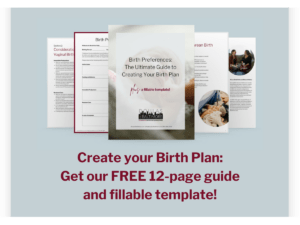There isn’t a handbook for pregnancy, birth, or parenthood and that can be overwhelming. If you’re finding yourself with notebooks or spreadsheets full of information to wade through, you’re not alone. We have access to an entire internet full of recommendations, be they current or outdated. Finding reasonable, science-backed answers can feel like an uphill battle and a lonely one at that. Are childbirth classes really necessary? Are newborn care classes worth it?Where can I find newborn classes and childbirth education in Baltimore?
That’s a call only you and your partner can make.
Childbirth Education
What is Childbirth Education?
Childbirth Education Classes are educational programs taught by experienced instructors well versed in the field of Pregnancy, Birth, and Postpartum. Childbirth Education curriculum varies and classes attended are generally chosen based on your preferences. Some focus heavily on a larger, trademarked curriculum such as Evidence Based Birth or Lamaze, while others are completely unique to the instructor such as Doulas of Baltimore’s signature Complete Childbirth Education Series.
Childbirth Education classes can be taught in person, online, in a group setting, or on an individual basis. There are many options and approaches, the bottom line is finding one that someone you trust teaches.
What should my class cover?
While there are many different types of curriculum, and the benefits of childbirth education still require more official study, it’s well known that access to education increases positive outcomes. When looking at classes, ensure yours covers these basic topics:
- Decision making strategies to ensure you remain an active participant in your birth story
- Tips for staying healthy and comfortable in late pregnancy
- Physiology and the process of labor and birth
- Common interventions and medication options
- How to create and communicate your birth preferences
- Hands-on coping, comfort and relaxation techniques
- Preparing for the postpartum experience
Whether you’re planning on going through childbirth without an epidural or are open to medication, understanding these key topics can help you create the birth and postpartum experience that will set you up for success.
Doulas of Baltimore is hosting our Spring session of our Complete Childbirth Series on Saturdays beginning April 6th, 2024 in Baltimore and our One Day Baby 101 workshop in Frederick. Our Complete Childbirth Series runs 4 weeks and covers 12 hours of science-backed education in an affirming and open environment. Our Baby 101 workshop is a one day intensive that gives new parents all the essential information they need. Learn more and register here!
Newborn Care Classes
What are Newborn Care Classes?
Newborn Care Classes are educational sessions for anyone who needs updated information on the care and keeping of newborn babies. Experienced teachers lead these classes who have taken professional training and work in the field. There are many different options for taking these classes including Hospital-based programs and more uniquely designed curriculum created by individuals. Ensure the source and how frequently the materials are updated are considered when searching for your classes. Safety standards for newborns and infants change regularly and ensuring you have the latest information ensures you’re able to keep your baby safe and those around your baby updated.
What should my class cover?
All Newborn Care classes should cover the basics of baby care such as feeding and diapering as well as:
- Preparing your home and family for a newborn
- Common baby gear and gadgets
- Normal newborn characteristics
- Hygiene including diapering, bathing, and dressing
- Crying and newborn communication
- Comfort and bonding techniques
- Newborn sleep patterns and safe sleep
- Feeding options and techniques
- Hunger and satiation cues
- Common feeding obstacles
Doulas of Baltimore has an opportunity for Newborn Care Education this Spring. Join us in Baltimore for our 4 Week Essential Newborn Care Series. This class runs 4 weeks and covers 12 hours of science-backed education in an affirming and open environment. Learn more and register here!
When considering the question, “What childbirth classes should I take?” consider who is teaching it, what the course covers, and if the curriculum is aligned with your birth wishes. If you’re searching for infant care classes for new parents we recommend ensuring that the course is based in science and has up-to-date information on safety and development for newborn babies. We recommend if you’re searching for Newborn classes and Childbirth Education in Baltimore or Frederick, consider Doulas of Baltimore!
We believe education is one of the most important things you can invest in. Above all when we educate ourselves we empower ourselves to make sound decisions, enter any situation with confidence, and create a great environment for a positive experience. Generally taking classes with your birth partner prior to giving birth can deeply connect you to one another creating a sense of safety and support.



